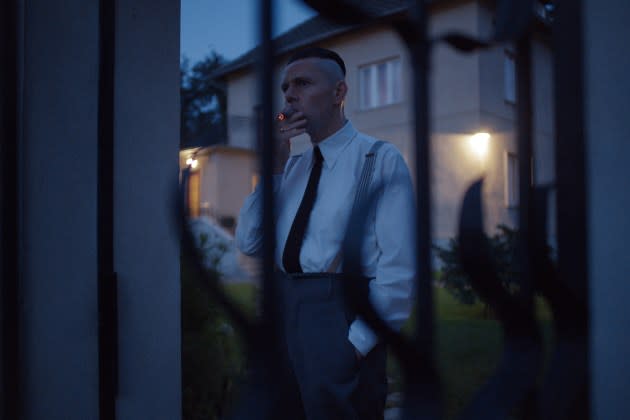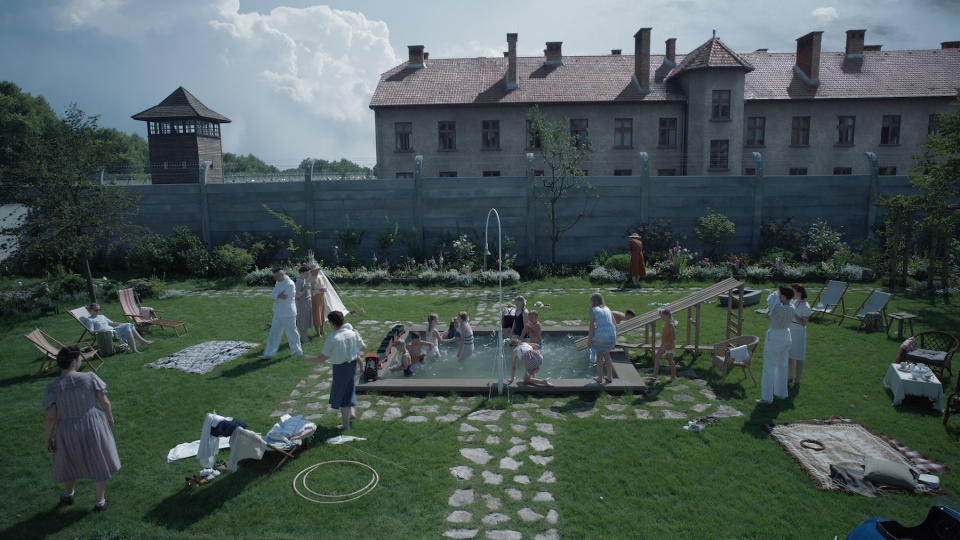‘The Zone of Interest’: Jonathan Glazer’s Chilling Holocaust Movie Is a Masterpiece
- Oops!Something went wrong.Please try again later.
- Oops!Something went wrong.Please try again later.

Holocaust movies are now a genre. It makes one more than a little queasy to acknowledge this. We’re talking about art that seeks to recreate an atrocity of such devastating scale and magnitude; to imagine the unimaginable. You can say the phrase “Holocaust movie” and a number of images and scenarios, conventions and clichés immediately spring to mind. Some of these feature films have been extraordinary. Several have been borderline exploitative. A few have been outright offensive. German philosopher Theodor Adorno is often misquoted as saying, “There’s no poetry after Auschwitz”; his actual statement was that “to write poetry after Auschwitz is barbarism.” And while these films may collectively help us to never forget what happened, they’ve also risked making us insensitive to such horrors. Barbarism is reduced to Oscar-clip fodder.
Jonathan Glazer’s The Zone of Interest — his first film in a decade, since 2013’s Under the Skin — is aware of this. So this loose adaptation of Martin Amis’ 2014 novel takes a different route. It knows what you’ve witnessed onscreen, so it takes a step back from the gates of hell and focuses instead on the residents around the abyss. Our tour guides are Rudolf and Hedda Höss (played by Christian Friedel and Sandra Hüller, both of whom deserve all the praise they get). They are Germans who have heeded the call to go east and settle, having relocated to Poland for Rudolf’s job. On the weekends, they and their brood of children have picnics and go swimming by a lake. Occasionally, they’ll have parties at their luxurious house, inviting over friends, neighbors, and colleagues to lounge in the sun. A greenhouse is situated next to a lush garden, filled with blooming flowers. It’s so picturesque, this portrait of domesticity, that you might not notice the gunshots, the barking dogs, or the shrieks of terror right away.
More from Rolling Stone
Rob Reiner: Norman Lear Fought People Like Trump His Entire Life
'Poor Things': What If Emma Stone Was Frankenstein But Feminist and Horny?
'Faraway Downs': How Baz Luhrmann Turned a Movie Misfire Into a Magnificent Miniseries
If you recognize the names, then you know who these people are and what’s happening. If you don’t, it isn’t until you see the guard tower and a chimney belching flames right outside the family’s backyard that you realize where you’re at. Rudolf was the commandant at Auschwitz. He and his loved ones lived on the perimeter of a camp that he personally helped turn into a “model of efficiency.” (The title takes its name from what the S.S. called the region surrounding Auschwitz where officers and their relatives resided.) You only see Höss inside its walls once, in a single shot that Glazer keeps as a tight close-up on his face. But you are forced to listen to everything going on around him — not off in the distance but at close-range. What you hear is death. What he hears is another day at work.
Then Höss is back home, reading bedtime stories to his kids, sharing inside jokes with his wife, wondering if hitting his quarterly numbers might lead to a promotion. All the while, a soundtrack of wails and weaponry and incoming trains play as if they were on a loop. Rudolf and Hedda and their offspring no longer register such things. But you do. And it’s that exact gap where Glazer has daringly placed this chronicle of the banality surrounding the banality of evil.
A filmmaker who transitioned from making groundbreaking, Hall-of-Fame music videos to tweaked genre deconstructions — you can technically dub Sexy Beast (2000), Birth (2004), and Under the Skin (2013) as a gangster movie, a supernatural thriller, and an alien-invasion parable, though that doesn’t begin to do any of these sui generis works justice — Glazer has perfected a sort of subzero-temp formalism that both attracts and repels viewers looking for familiar narrative toeholds. The stranger his approach, the more you tend to be dazed and amazed by the way his high style pushes the storytelling into exhilaratingly odd places. (We’ve still never been able to shake the sight of Scarlett Johansson’s extraterrestrial predator luring Scottish lads into pitch-black feeding tarpits in Under the Skin.)
He’s one of the few filmmakers to earn the descriptive “visionary,” and it would be incredibly easy to get caught up in the sound and vision that he puts on display here: the Douglas Sirk-like use of color, the gliding tracking shots, the sound design described as “ambient genocide,” a score by Mica Levi that pulses and groans, the interludes of solid color and thermal imaging. Multiple cameras were set up inside the Höss house, all the better to capture Friedel, Hüller, and the rest of the cast moving in and around the domicile and going about their daily routines. There are times when it feels like you’re watching a reality series from 1944.

Except all of these elements aren’t being used to dazzle or awe; they’ve been carefully and meticulously employed to make a point and immerse you in a mood. Glazer does not want you to be wowed by The Zone of Interest — he wants you to understand how things like this happen, and who makes such things happen. It was done by men with families, wives who take issue with uneven power dynamics in their marital partnerships, regular people who lace antisemitic bile into their polite coffee-klatch chatter. It was done with the constant humming of hell in the background, all but absorbed into the daily fabric of those just going about their business following orders.
Glazer drops in a number of casual asides, from Höss realizing he’s standing in a river polluted with the ashes of the dead to his boys playing with found gold teeth, that are all the more nauseating for their unceremonious presentation. Both Friedel and Hüller don’t play this couple as monsters; they play them as mundane folks, which makes their cruelty and compartmentalization that much more chilling. This is the way the normalization of fascism and mass murder works, the film tells us.
But it also wants to warn us that: This was not the result of aliens, or the supernatural, or some primitive Neanderthals. This was the result of human beings determined to kill other human beings. And while The Zone of Interest has no interest in making you feel empathy for the Hösses — it has none for them, nor should it — the film demands you recognize the common ground of “us,” rather than “them.” Look at the similarities rather the differences, it asks, and the fact that it does this without disrespecting the unfathomable tragedy of it all is what makes this an entirely different, entirely profound take. Some have said that Glazer’s film is a reinvention of the Holocaust movie, but that’s glibly giving this masterpiece short shrift. It’s a work that forces you to reexamine how we’ve processed this chapter of history and restores a proper sense of ungraspable horror.
Without giving away the shock of the ending, there’s a flash-forward that presents us with the legacy of what we’ve witnessed, before fading out on Höss vomiting and choking on the history of the 20th century’s great moral failure. Unlike most such dramas, it does not want you to leave thinking of the past. It needs you to pay very close attention to the present.
Best of Rolling Stone

